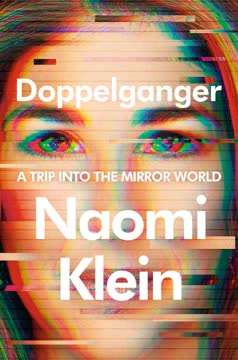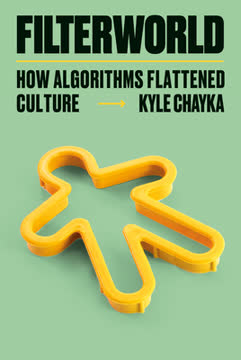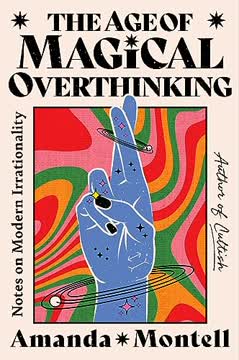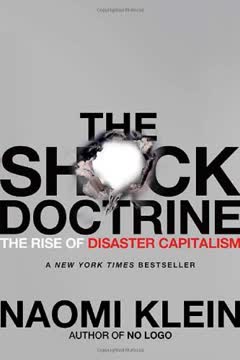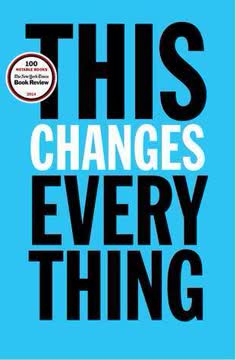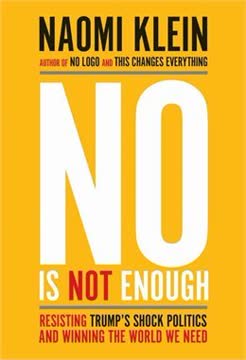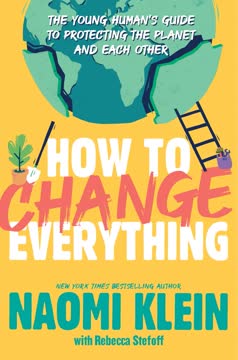Key Takeaways
1. The Doppelganger Experience Reveals a Deeper Cultural Malaise
In the end, looking at her helped me see myself more clearly, but it also, oddly, helped me better see the dangerous systems and dynamics we are all trapped inside.
Personal and Political Entanglement. The author's chronic confusion with her doppelganger, Naomi Wolf, becomes a lens through which to examine broader societal issues. This personal predicament mirrors the larger cultural anxieties about identity, truth, and the forces destabilizing our world. The doppelganger experience serves as a guide to understanding the complexities of our "doppelganger culture."
Uncanny and Unsettling. The presence of a double walking around is profoundly unsettling, creating a sense of uncanniness. This feeling is particularly acute when the double undergoes a dramatic political transformation, making the original question their own identity. The author grapples with the blurring lines between herself and her doppelganger, leading to an existential crisis.
Warping Reality. The author's experience reflects a broader sense that reality is somehow warping. Many people report losing loved ones "down the rabbit hole" of conspiracy theories and misinformation. The forces destabilizing the author's world are part of a larger web destabilizing our larger world.
2. Identity Confusion Highlights the Precariousness of Self in the Digital Age
Am I who I think I am, or am I who others perceive me to be?
Losing Control. The author's identity is repeatedly confused with that of her doppelganger, leading to a loss of control over her own image and reputation. This highlights the precariousness of identity in the digital age, where carefully constructed selves can be undone by a hacked account or a deep fake. The author's experience taps into the painful truth that our personal lives and public personas are vulnerable to forces outside our control.
Digital Avatars. The confusion between the author and her doppelganger is exacerbated by the flattening and blurring effects of social media platforms. Digital avatars offer approximated versions of our physical selves, further blurring the lines between reality and representation. The author's public self shrinks down to a thumbnail-sized photo and Twitter's 280-character limit, making it easier for others to conflate her with her doppelganger.
Machine Learning. The algorithms of social media platforms contribute to the confusion by prompting it and helpfully filling in the mistake for its users. This is how machine learning works—the algorithm imitates, learning from patterns. The author's name starts being suggested instead of her doppelganger's, leading to even more mix-ups.
3. Conspiracy Theories Thrive on Unaddressed Fears and Societal Fractures
Those fears distract people from judging the accuracy of the content they may read online.
Fear and Anxiety. Conspiracy theories find a ready audience with a public in a state of generalized fear of getting seriously ill and possibly dying, and simultaneously has very real worries about what public health measures like stay-at-home orders, school closures, and masking would mean for their livelihoods and loved ones. These fears distract people from judging the accuracy of the content they may read online. The author's doppelganger exploits these fears by promoting misinformation about Covid-19.
Lack of Trust. The spread of conspiracy theories is fueled by a lack of trust in official sources and institutions. People who feel that their concerns are not being addressed by mainstream media or political leaders are more likely to turn to alternative narratives. The author's doppelganger capitalizes on this distrust by presenting herself as a truth-teller who is willing to challenge the official narrative.
Social Media Echo Chambers. Social media platforms amplify the spread of conspiracy theories by creating echo chambers where people are primarily exposed to information that confirms their existing beliefs. This makes it difficult for people to encounter alternative perspectives or to critically evaluate the claims being made. The author's doppelganger uses social media to cultivate a loyal following and to disseminate her misinformation to a wide audience.
4. The Allure of the Mirror World Lies in Its Rejection of Elite Power Structures
I felt like she had taken my ideas, fed them into a bonkers blender, and then shared the thought-puree with Carlson, who nodded vehemently.
Distorted Reflections. The author's doppelganger takes her ideas about corporate power and distorts them into conspiracy theories. This creates a mirror world where the same issues are being discussed, but with radically different interpretations and conclusions. The author's doppelganger presents herself as a champion of the people who is fighting against elite power structures.
Exploiting Legitimate Concerns. The author's doppelganger taps into legitimate fears about digital surveillance and the erosion of privacy. She presents vaccine passports as a tool of mass surveillance and control, resonating with people who are already concerned about the power of Big Tech. The author's doppelganger provides people with a focal point for their fear and outrage over digital surveillance.
Offering a Plan of Action. The author's doppelganger offers her followers a plan of action, even if it is based on misinformation. She encourages them to resist mask mandates, vaccine passports, and other public health measures. The author's doppelganger gives her followers something to do, a sense of agency in the face of overwhelming forces.
5. Personal Branding and the Performance of Self Contribute to a Culture of Doubling
Self-branding is yet another form of doubling, an internal sort of doppelganging.
Commodification of Self. The pressure to create a consumable, public-facing identity leads to a partitioning between the private sense of self and the imperative to create a marketable persona. This process requires individuals to label difficult experiences in specifically marketable ways, turning them into something fixed, salable, and potentially profitable. The author's students describe the process as "packaging up your trauma into a consumable commodity."
Digital Doubles. The carefully constructed self can be undone in any number of ways and in an instant—by a disabling accident, by a psychotic break, or, these days, by a hacked account or a deep fake. The author's students grow up with an acute consciousness of having an externalized double—a digital double, an idealized identity that is partitioned from their "real" selves and that serves as a role they must perform for the benefit of others if they are to succeed. The author's students must project the unwanted and dangerous parts of themselves onto others.
Alienation. The commodification of the self requires a partitioning, an internal doubling that is inherently alienating. There is you, and then there is Brand You. As much as we might like to believe that these selves can be kept separate, brands are hungry, demanding things, and one self necessarily impacts the other.
6. The Fascist Double Threatens to Engulf Liberal Democracies
As my investigation has worn on, this is the form of doppelganger that increasingly preoccupies me: the fascist clown state that is the ever-present twin of liberal Western democracies, perpetually threatening to engulf us in its fires of selective belonging and ferocious despising.
Shadow Versions. The figure of the doppelganger has been used for centuries to warn us of these shadow versions of our collective selves, of these monstrous possible futures. The author feels and fears a decisive flip from democratic to authoritarian, secular to theocratic, and pluralist to fascistic. In some places, the flip has already taken place.
Selective Belonging. The fascist clown state is the ever-present twin of liberal Western democracies, perpetually threatening to engulf us in its fires of selective belonging and ferocious despising. The author is increasingly preoccupied with this form of doppelganger. The figure of the doppelganger has been used for centuries to warn us of these shadow versions of our collective selves, of these monstrous possible futures.
Warped Reflection. The pandemic, layered on top of so many other long-repressed emergencies, has taken humanity somewhere we have not been before, somewhere close but different. That difference is what accounts for the strangeness so many of us have been trying to name—everything so familiar, and yet more than a little off.
7. Reclaiming Language and Building Solidarity Are Essential to Countering Disinformation
I have come to accept, however, that while these distinctions matter to me, and no doubt to her, most people couldn’t care less.
Distorted Concepts. The author's doppelganger and her fellow travelers have spent years mangling the meaning of the fight against authoritarianism, fascism, and genocide. This is happening at a time when we are in dire need of a robust anti-fascist alliance. The author feels that it is important to reclaim the meaning of these terms.
Democratic Media. The author feels that we have outsourced the management of our critical informational pathways to algorithms run by for-profit companies, working hand in glove with governments. The solution to this informational crisis is not to look to tech oligarchs to disappear people we don’t like; it’s to get serious about demanding an information commons that can be counted upon as a basic civic right.
Building Alliances. The author feels that the kind of mass movement needed to challenge the power of tech oligarchs does not yet exist. She feels that it is important to build alliances with people who are not already in our movements. The author feels that we must not be afraid to reach across the aisle and engage in dialogue with people who hold different views.
8. The Pandemic Amplified Existing Social and Political Divides
Covid had canceled so many of the things that had, for years, told me who I was in the world.
Exacerbated Isolation. The pandemic forced many people into prolonged stress and isolation, making them more vulnerable to states of shock. The author's own isolation grew more extreme when she returned to Canada. The months and months without humans in bodies to feel and think with pushed her to the edge.
Digital Dependence. The author's isolation led her to spend more time online, seeking simulation of the friendships and communities she missed. Instead, she found The Confusion: a torrent of people discussing her and what she’d said and what she’d done—only it wasn’t her. The world was disappearing, and so was she.
Blurred Boundaries. The barriers between the author and her doppelganger got blurred as well. Her public self had shrunk down to that thumbnail-sized photo and Twitter’s 280-character limit, and now, thanks to her, she didn’t even have that. She felt like shrunken Alice telling the Caterpillar, “I’m not myself, you see … being so many different sizes in a day is very confusing.”
9. The Seduction of Victimhood and the Erosion of Shared Reality
In their telling, it was actually vaccinated people who were the selfish ones sacrificing the vulnerable, and who were the spreaders and shedders.
Turning the Tables. The author's doppelganger and her fellow travelers had taken the argument for vaccines—which is that we belong to communities of enmeshed bodies, so what we do and don’t do to our bodies affects the health of other bodies, especially vulnerable bodies—and flipped it on its head. In their telling, it was actually vaccinated people who were the selfish ones sacrificing the vulnerable, and who were the spreaders and shedders. The author feels that this considerably upped the ante on her getting confused with her doppelganger.
Projection and Absolution. The appeal of the shedding theory is laid bare as the ultimate tool of projection and absolution. The author's doppelganger and her fellow travelers had taken the argument for vaccines—which is that we belong to communities of enmeshed bodies, so what we do and don’t do to our bodies affects the health of other bodies, especially vulnerable bodies—and flipped it on its head.
Erosion of Trust. The author feels that the confusion was now so frequent that Twitter’s algorithm was prompting it, helpfully filling in the mistake for its users, to save them precious time. This is how machine learning works—the algorithm imitates, learning from patterns. The author feels that this is what happens when we allow so many of our previously private actions to be enclosed by corporate tech platforms.
10. The Path to Integration Requires Confronting Uncomfortable Truths and Embracing Collective Action
Are we there yet? Not all of us, at least not quite yet. But the pandemic, layered on top of so many other long-repressed emergencies, has taken humanity somewhere we have not been before, somewhere close but different.
Finding Bearings. The author feels that it’s past time to find our bearings in this new place. In his novel The Double, José Saramago includes an epigraph: “Chaos is merely order waiting to be deciphered.” The author feels that it is important to decipher the chaos of doppelganger culture, with its maze of simulated selves and digital avatars and mass surveillance and racial and ethnic projections and fascist doubles and the studiously denied shadows that are all coming to the surface at once.
Collective Power. The point of this mapping is not to stay trapped inside the house of mirrors, but to do what I sense many of us long to do: escape its mind-bending confines and find our way toward some kind of collective power and purpose. The point is to make our way out of this collective vertigo, and get somewhere distinctly better, together.
Deciphering Chaos. The author feels that it’s going to take some wild turns—but rest assured that the point of this mapping is not to stay trapped inside the house of mirrors, but to do what I sense many of us long to do: escape its mind-bending confines and find our way toward some kind of collective power and purpose. The point is to make our way out of this collective vertigo, and get somewhere distinctly better, together.
Last updated:
FAQ
1. What is Doppelganger: A Trip into the Mirror World by Naomi Klein about?
- Exploration of doubles and identity: The book investigates the phenomenon of doppelgangers—uncanny doubles or mirror selves—using Klein’s personal experience of being confused with Naomi Wolf as a lens to examine broader cultural, political, and technological issues.
- Mirror World concept: Klein introduces the idea of a “Mirror World,” a fractured reality where misinformation, conspiracy theories, and polarized identities thrive, distorting truth and public discourse.
- Historical and contemporary analysis: The narrative connects past atrocities like colonialism and the Holocaust to present-day crises such as Covid misinformation, climate change, and rising authoritarianism.
- Call for integration and solidarity: Ultimately, Klein advocates for confronting our collective shadows and divisions to build a more caring, interconnected society.
2. Why should I read Doppelganger: A Trip into the Mirror World by Naomi Klein?
- Unique blend of memoir and analysis: The book combines personal narrative, cultural critique, and historical research, offering a rare perspective on how individual identity crises mirror societal fractures.
- Insight into current crises: Klein provides a deep understanding of how conspiracy theories, fascism, and ecological collapse are interconnected and manifest in today’s world.
- Encourages critical reflection: Readers are challenged to reconsider narratives about history, victimhood, and power, moving beyond binaries toward solidarity and collective action.
- Hopeful pathways forward: Despite heavy themes, Klein ends with a call to “unselfing” and collective organizing, inspiring readers to imagine and build alternative futures.
3. What are the key takeaways and warnings from Doppelganger: A Trip into the Mirror World by Naomi Klein?
- Beware of doubling and distortion: The proliferation of doppelgangers—personal, digital, and political—reflects deep societal fractures that threaten shared reality and democratic norms.
- Trivialization and pipikism: Klein warns that the cultural tendency to trivialize serious issues (“pipikism”) undermines activism and meaningful discourse.
- Urgency of collective meaning-making: She stresses the need to resist fragmentation by building collective narratives and power to confront crises like climate change and authoritarianism.
- Call for reclaiming information commons: The book advocates for reclaiming digital spaces from corporate and authoritarian control to ensure trustworthy information and protect democratic discourse.
4. How does Naomi Klein use the concept of the doppelganger in Doppelganger: A Trip into the Mirror World?
- Uncanny double as metaphor: The doppelganger represents the frighteningly familiar yet alien double, causing identity crises and paranoia, both personally and societally.
- Warning and mirror: Historically, doubles serve as warnings or harbingers, signaling ignored or repressed parts of ourselves or society, with potential dangers if unheeded.
- Societal and digital doubling: Klein shows how doubling occurs at both the personal and societal levels, including in digital culture where people perform partitioned selves or “brands.”
- Fascist doubles: The book highlights the “fascist clown state” as a shadow twin of liberal democracies, a monstrous double threatening to engulf societies.
5. What is the “Mirror World” in Doppelganger: A Trip into the Mirror World by Naomi Klein, and how does it affect society and politics?
- Distorted and polarized reality: The Mirror World is a fractured landscape where opposing camps define themselves in opposition, often adopting contradictory beliefs and narratives that mirror and distort each other.
- Platform for misinformation: It is a space where conspiracy theories, misinformation, and performative identities flourish, fueled by digital platforms and figures like Naomi Wolf and Steve Bannon.
- Diagonalism and new alliances: Klein describes “diagonalism,” where left and right elements blend into new, often far-right, coalitions united by distrust of elites and shared grievances.
- Threat to democracy: The Mirror World embodies the dangerous doubles of liberal democracies, including rising authoritarianism and the erosion of shared reality necessary for democratic governance.
6. How does Naomi Klein analyze personal branding and identity in Doppelganger: A Trip into the Mirror World?
- Branding as internal doubling: Klein discusses personal branding as a form of internal doubling, where individuals create curated, consumable identities (“Brand You”) that are partitioned from their authentic selves.
- Conflict with authenticity: She reflects on her own conflicted relationship with branding, having become an “anti-brand brand” with her book No Logo, yet recognizing the pressures of maintaining a consistent public persona.
- Digital self and surveillance: The book explores how personal branding is intertwined with surveillance capitalism, where data-driven digital doubles are created by algorithms, complicating selfhood and control.
- Cultural and political implications: Klein argues that the demand for fixed, singular brands undermines the healthy multiplicity of the self necessary for critical thinking and collective action.
7. What is “pipikism” in Doppelganger: A Trip into the Mirror World by Naomi Klein, and why is it important?
- Definition of pipikism: Pipikism, or “bellybuttonism,” is described as the force that trivializes, farcicalizes, and superficializes serious issues, making meaningful engagement difficult.
- Impact on public discourse: Pipikism turns critical issues into spectacles or jokes, undermining the seriousness needed for activism and policy change.
- Examples in culture and politics: Figures like Steve Bannon, Tucker Carlson, and Naomi Wolf are cited as agents of pipikism, appropriating important terms and diluting their meaning.
- Barrier to activism: This tendency fosters cynicism and speechlessness, making it harder to mobilize collective action and resist authoritarianism.
8. How does Doppelganger: A Trip into the Mirror World by Naomi Klein connect wellness culture, conspiracy theories, and far-right politics?
- Wellness and conspiracy: Klein highlights how parts of the wellness industry, including fitness influencers and alternative health practitioners, have become entangled with Covid denialism and conspiracy theories.
- Hyper-individualism: Wellness culture’s emphasis on personal responsibility and body optimization aligns with far-right libertarianism’s focus on individualism, rejecting collective solutions.
- Supremacist undercurrents: The pursuit of “pure” and “optimized” bodies can echo fascist ideas of genetic superiority and disposability of the weak.
- Economic motivations: Many wellness influencers monetize fear and misinformation, selling products and services that exploit anxieties about health and control.
9. How does Naomi Klein address the relationship between autism, parenting, and anti-vaccine movements in Doppelganger: A Trip into the Mirror World?
- Vaccine-autism myth origins: Klein traces the origins and persistence of the debunked claim that vaccines cause autism, showing how it laid the groundwork for Covid vaccine skepticism.
- Parental grief and denial: Many parents of autistic children experience grief over lost expectations and may turn to conspiracies or extreme therapies as a way to cope.
- Historical and cultural context: These dynamics are linked to societal pressures around perfection, control, and the stigmatization of disability, as well as to the legacy of eugenics and Nazi-era policies.
- Doppelganger of the child: The book explores the concept of children as doubles or extensions of parents’ identities, complicating acceptance of neurodiversity and fueling denial and control impulses.
10. How does Doppelganger: A Trip into the Mirror World by Naomi Klein connect historical colonialism, the Holocaust, and contemporary crises?
- Colonial roots of Nazi ideology: Klein highlights how Hitler and the Nazis drew inspiration from British colonialism and racial hierarchies in North America, including the use of concentration camps and eugenics laws.
- Continuity of extermination policies: The Holocaust is presented as the culmination of a long history of genocidal practices rooted in European colonial expansion and racial violence.
- Parallels recognized by Black intellectuals: Figures like W. E. B. Du Bois and Aimé Césaire saw the Holocaust as a continuation of colonial violence, with Europeans tolerating such brutality when inflicted on non-European peoples.
- Modern implications: The book draws connections between these historical patterns and present-day issues like climate crisis, settler colonialism, and rising authoritarianism.
11. What is the significance of “Unselfing” and integration in Doppelganger: A Trip into the Mirror World by Naomi Klein?
- Unselfing as resistance: Drawing on thinkers like bell hooks and Iris Murdoch, Klein describes unselfing as the process of decentering the ego to connect more deeply with others and the natural world.
- Integration of shadow selves: The book emphasizes the need to confront and integrate the parts of ourselves and society we deny or project, moving beyond partitioned identities toward solidarity.
- Collective action and coalition: Klein argues that individual change is insufficient; systemic transformation requires collaboration across differences, building movements that can challenge entrenched power.
- Hope in historical models: She points to past experiments like Red Vienna and the Jewish Labor Bund as examples of care-based, inclusive societies that can inspire new futures.
12. What are the best quotes from Doppelganger: A Trip into the Mirror World by Naomi Klein and what do they mean?
- “Calm is a form of resistance.” (John Berger): Emphasizes the importance of maintaining composure and clarity amid chaos and shock, enabling focused action rather than panic.
- “I AM THE YOU THAT IS NOT WORDS.” (Fake Roth): Highlights the tension between representation and action, questioning what makes a person
Review Summary
Doppelganger explores the concept of doubles through Naomi Klein's experiences being confused with Naomi Wolf. Klein examines how conspiracy theories, misinformation, and political extremism have gained traction, especially post-pandemic. The book delves into topics like capitalism, fascism, and climate change, offering insights into modern society's complexities. Readers appreciate Klein's analysis and writing style, though some find the doppelganger theme forced at times. While praised for its relevance and depth, a few critics argue it lacks novel ideas or concrete solutions.
Similar Books
Download PDF
Download EPUB
.epub digital book format is ideal for reading ebooks on phones, tablets, and e-readers.
